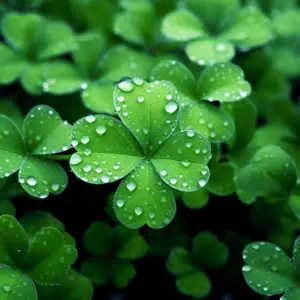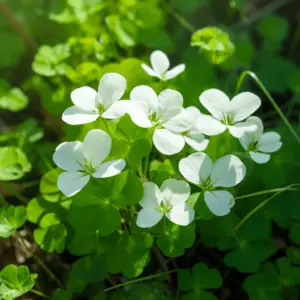You have carefully chosen the lawn grass, worked the soil, sprouted the seeds, watered and mowed them daily. However, just about when you have your lawn looking like golf-course grass, some nasty white clovers start having a feast on your lawn. Now you wonder whether to douse your whole lawn in chemicals to safeguard the grass from the white clovers.
Fortunate enough, you don’t have to risk your whole lawn when dealing with a white clover weed problem. Keep reading and find out the surefire solutions on how to get rid of white clovers without destroying the lawn.
Table of Contents
Getting Rid of White Clovers Without Destroying the Lawn

Identifying the white clovers
The white clover is a perennial clover weed that is quickly spreading with white flowers. As a member of the clover family, you can count on the white clover to be a common lawn weed problem and a nuisance at it.
However, the positive is that white clover (like all clovers) can produce nitrogen on its own, especially in underfed lawns. Some homeowners find this beneficial as it helps make their lawns lush and greener.
Unfortunately, these white clovers become a menace after some time as they compete and even outgrow your lawn grass. Luckily, you won’t need to write off your whole lawn because of a white clover problem. Here are ways natural and recommended methods at getting rid of white clovers without destroying the yard.
Old-School Manual Removal
During an early onset of white clovers, manual removal by hand, trowel, or a weeding tool is the go-to option to cut their growth early. Remember, small patches have not spread at this stage, so it’s wise to get rid of them before they override the whole lawn.
However, manual removal needs utmost care to ensure to don’t damage other plants and get the job done once. So, you are encouraged to do the white clover uprooting when the ground is wet for best results since it’s easier. You can also ensure that the manual removal gets rid of the clovers with the roots in place. Otherwise, you could face a regrowth of the white clovers later on.
Eliminating With Vinegar
Vinegar comes with plenty of surprising uses, and a natural weed killer is one way the solution is a remedy. The acetic acid inside vinegar is essential since it helps dry out the weeds and kills them. Once the white clovers dry up, you can remove them manually(plus the roots) and prevent further growth. Be sure that you use spot treatment on the white clovers to avoid the surrounding grass being collateral damage.
With a DIY Homemade Remedy
White vinegar is an excellent solution on its own; you can achieve even better results with this DIY homemade remedy. The effective mixture will have you adding a cup of salt plus a squirt of dishwashing soap.
Take these items and add to one gallon of vinegar solution, then mix. Spray this mixture onto the white clover patches daily till they dry. You can finally uproot the white clovers once they are dead and dry.
Fertilizing Your Lawn
A well-fertilized lawn comes in handy when fighting weeds of all kinds, not just white clovers. For example, using an excellent organic fertilizer allows the right plants, such as grass, to have a growing advantage and thrive. This is not the case when you leave your lawn unattended and not fertilized.
Once the lawn is underfed, the white clovers quickly move in since they can provide for their fertilizer while the grass cant. So, a quick solution is to fertilize your lawn well and keep out white clovers plus other weeds.
Mowing Properly
You also have to consider mowing could also help with your white clover problem. As you can tell, clovers are low-growing weeds with a shallow root system. So, when mowing, you can raise your mowing deck to three inches or more to have a taller grass turf.
The taller grass would then block the short white clovers from getting proper sunlight, drying them out. Of course, this goes against the common notion of having a short turf, but you will have to reconsider your stand with a clover problem.
Starve the Clovers
Here, plenty of plastic sheets will help cover the large patches of clovers in your lawn. Get these plastic sheets or garbage bags to protect the top of the white clovers and secure them by the corners.
Come back after a few weeks and check if the clovers are dead by then. However, be sure this method presents an ugly lawn site for some folks and could also cover your surrounding lawn grass.
Using Herbicides

Weed killing herbicides should be your last resort after all the natural methods fail to kill the white clover. Bear in mind, you can never be too careful with herbicides, and any wrong move could have you harming your whole lawn.
The rule of thumb here is to ensure you are selective on the suitable herbicide for killing the white clover menace. Currently, an excellent example of white clover killer herbicides includes the likes of Roundup For Lawns 2 Concentrate, Ortho Weed B Gon, and Scotts Liquid Turf Builder with Plus 2 Weed Control. For best results, you could also try the recommended ADIOS Clover killer that is odorless and non-toxic.
Still, these herbicides are not 100% effective and can fail depending on the situation. However, if you are inclined to use them, then ensure you follow instructions correctly.
Seal The Bald Spots
Once you get rid of the white clover patches, you are left with bare areas that can be an eyesore to a beautiful lawn. The solution is to get back to planting grass right away and covering the killed patches. Only through planting can you prevent a white clover regrowth and have your lawn back looking uniform.
Final Note
Trying out our different tips and strategies on how to get rid of white clovers without destroying the lawn is a great place to start. You are sure to have at least one or two methods that will indeed work and get your lawn in top condition. However, if nothing works, you still have the option to rip up everything and get rid of all weeds for good. Just be sure you have tried every viable solution before getting to the extent of destroying your lawn.
